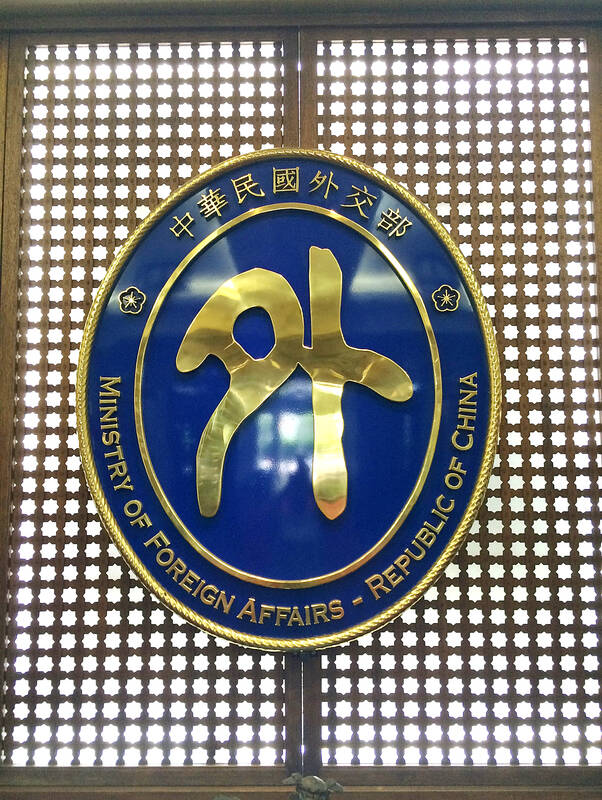It is regrettable that the Chinese government does not understand normal diplomatic behaviors between democratic countries and thus frequently takes provocative actions, the Ministry of Foreign Affairs said in a statement yesterday.
China on Sunday expressed its opposition to a telephone call between President William Lai (賴清德) and US Representative Nancy Pelosi during Lai’s stopover in Hawaii, as well as its opposition to US arms sales to Taiwan.
Before Lai departed on his seven-day tour to Taiwan’s diplomatic allies in the Pacific on Saturday, the US government on Friday announced a US$387 million arms sale to Taiwan.

Photo: Lu Yi-hsuan, Taipei Times
“It is regrettable that the Chinese government does not understand normal diplomatic behaviors between democratic countries, thus frequently takes provocative actions,” the ministry said yesterday, as it urged Beijing to “be rational and have self-constraint.”
Pelosi in the phone call told Lai the US Congress shows bipartisan support for Taiwan, the ministry said, adding that she also mentioned her support for Taiwan’s participation in international organizations.
“The Republic of China (Taiwan) is an independent sovereign state, which has the right and free choice to interact and develop relationships with countries around the world,” it said. “We refuse to be interfered or suppressed by any country for any reason, nor set self-limitations.”
The ministry also thanked the US government for firmly fulfilling its commitment to Taiwan’s security based on the Taiwan Relations Act and the “six assurances.”
The 1979 act stipulates that commercial, cultural and other unofficial relations be sustained between Taiwan and the US after Washington switched diplomatic recognition from Taipei to Beijing.
It also requires the US “to provide Taiwan with arms of a defensive character.”
The “six assurances,” which were issued by then-US president Ronald Reagan in 1982, include a pledge that the US would not to set a date for ending arms sales to Taiwan.

An essay competition jointly organized by a local writing society and a publisher affiliated with the Chinese Communist Party (CCP) might have contravened the Act Governing Relations Between the People of the Taiwan Area and the Mainland Area (臺灣地區與大陸地區人民關係條例), the Mainland Affairs Council (MAC) said on Thursday. “In this case, the partner organization is clearly an agency under the CCP’s Fujian Provincial Committee,” MAC Deputy Minister and spokesperson Liang Wen-chieh (梁文傑) said at a news briefing in Taipei. “It also involves bringing Taiwanese students to China with all-expenses-paid arrangements to attend award ceremonies and camps,” Liang said. Those two “characteristics” are typically sufficient

A magnitude 5.9 earthquake that struck about 33km off the coast of Hualien City was the "main shock" in a series of quakes in the area, with aftershocks expected over the next three days, the Central Weather Administration (CWA) said yesterday. Prior to the magnitude 5.9 quake shaking most of Taiwan at 6:53pm yesterday, six other earthquakes stronger than a magnitude of 4, starting with a magnitude 5.5 quake at 6:09pm, occurred in the area. CWA Seismological Center Director Wu Chien-fu (吳健富) confirmed that the quakes were all part of the same series and that the magnitude 5.5 temblor was

The brilliant blue waters, thick foliage and bucolic atmosphere on this seemingly idyllic archipelago deep in the Pacific Ocean belie the key role it now plays in a titanic geopolitical struggle. Palau is again on the front line as China, and the US and its allies prepare their forces in an intensifying contest for control over the Asia-Pacific region. The democratic nation of just 17,000 people hosts US-controlled airstrips and soon-to-be-completed radar installations that the US military describes as “critical” to monitoring vast swathes of water and airspace. It is also a key piece of the second island chain, a string of

The Central Weather Administration has issued a heat alert for southeastern Taiwan, warning of temperatures as high as 36°C today, while alerting some coastal areas of strong winds later in the day. Kaohsiung’s Neimen District (內門) and Pingtung County’s Neipu Township (內埔) are under an orange heat alert, which warns of temperatures as high as 36°C for three consecutive days, the CWA said, citing southwest winds. The heat would also extend to Tainan’s Nansi (楠西) and Yujing (玉井) districts, as well as Pingtung’s Gaoshu (高樹), Yanpu (鹽埔) and Majia (瑪家) townships, it said, forecasting highs of up to 36°C in those areas